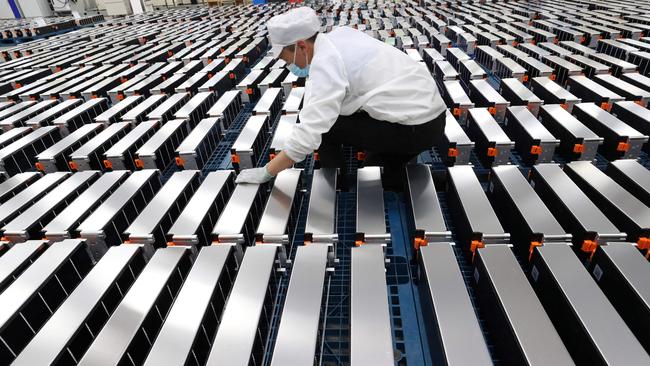AustralianSuper to get zero return on big stake in Jervois Global
Australia’s largest superannuation fund will be left empty-handed after embattled cobalt producer Jervois Global unveiled a $233.5m recapitalisation deal with a major lender.

Australia’s largest superannuation fund and other shareholders will be left empty-handed after cobalt producer Jervois Global unveiled a $233.5m recapitalisation deal with its major US lender.
The deal with Boston-based Millstreet Capital Management will see Jervois enter voluntary administration and become privately owned under provisions in Chapter 11 of the US Bankruptcy Code.
Jervois chief executive Bryce Crocker said he was disappointed for AustralianSuper and other shareholders who came on board when the company was considered a prime vehicle for investors seeking exposure to non-China cobalt supply chains.
Cobalt prices plunged to all-time lows in 2024 amid a massive increase in production from Chinese companies operating in the Democratic Republic of Congo.
Mr Crocker said it was not his place to speculate on China’s motivation, but it had oversupplied the market to an extent that was almost unprecedented in any commodity, and was continuing to stockpile cobalt.
“With the benefit of hindsight, we took on too much debt and once China flooded the market and cobalt prices fell significantly, we had a problem with a lender,” he said.
“And as you know with the capital stack, the lender sits at the top and shareholders sit at the bottom.”
Millstreet has been providing Jervois with waivers and interim funding to get through to this point.
AustralianSuper, Jervois’s biggest shareholder with more than 23 per cent of the stock, and other shareholders will get nothing back on their investment under the Millstreet deal. Jervois shares last traded at about 1c, down from as high as 91c in April 2022.
The debt-laden company’s assets include a cobalt refinery in Finland, a high-grade cobalt deposit in the US state of Idaho and a nickel and cobalt refinery in Sao Paulo, Brazil.
AusSuper came on board in 2019 when Jervois acquired the then part-built Idaho mine that is now in mothballs because of the cobalt price plunge.
The US Department of Defense is funding part of the maintenance costs at Idaho and Jervois has been in close contact with the US select committee on China regarding domestic price support for cobalt.
The recapitalisation is expected to provide $US145m ($233.5m) of capital to fund the business, including the restart of the refinery in Brazil.
Jervois was in talks with stakeholders and Millstreet about partnerships, joint ventures and the sale of assets throughout 2024.
The company said the negotiations, held with the cobalt price tanking, failed to produce a more favourable transaction.
“Obviously, it’s not positive for shareholders, which includes ourselves, but it is positive for many other stakeholders in our company, whether it’s suppliers, customers or governments that we’re dealing with on critical minerals policy,” Mr Crocker said.
Millstreet currently provides $US150m in finance to the profitable Finland operations, is the majority and controlling lender of $US100m in bonds tied to the Idaho project and holder of $US25m in convertible notes issued by Jervois.
Jervois said the deal with Millstreet would reduce debt by about $US170m, including a full debt to equity conversion of the Idaho bonds and the convertible notes plus an expected $US44.5m repayment on the Finland finance package.
The Finnish refinery is the biggest of its kind outside China and was producing about 10 per cent of the battery-grade cobalt needed in the electric vehicle market by the end of 2023.
Mr Crocker said China appeared to have decided about 20 years ago that it could take a dominant position in critical minerals.
“They have successfully implemented that strategy, and cobalt is part of a portfolio that includes lithium, graphite, solar panels, electric vehicles, lithium-ion batteries where they have got a profound advantage,” he said.
AusSuper declined to comment. Jervois represents the latest battery minerals setback for the fund, which is also monitoring developments with graphite producer Syrah Resources. Syrah’s mining operations and US funding arrangements remain in limbo in the wake of post-election protests that rocked Mozambique in 2024.
AusSuper has a near 33 per cent stake in Syrah, which declared force majeure on graphite production in December and disclosed it was in default on loans with the US International Development Finance Corporation (DFC) and US Department of Energy.
Syrah has yet to update the market on its Mozambique operations but recently joined forces with North American graphite companies to urge US trade authorities to investigate “dumping of certain graphite products from China in the US at unsustainable and unfair prices”.






To join the conversation, please log in. Don't have an account? Register
Join the conversation, you are commenting as Logout